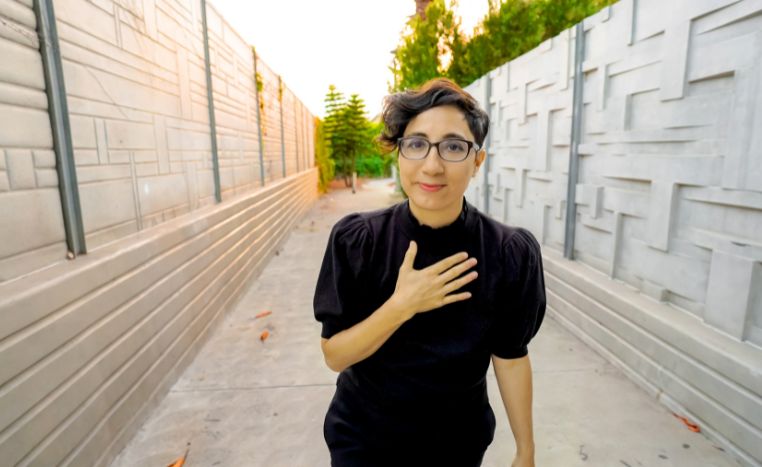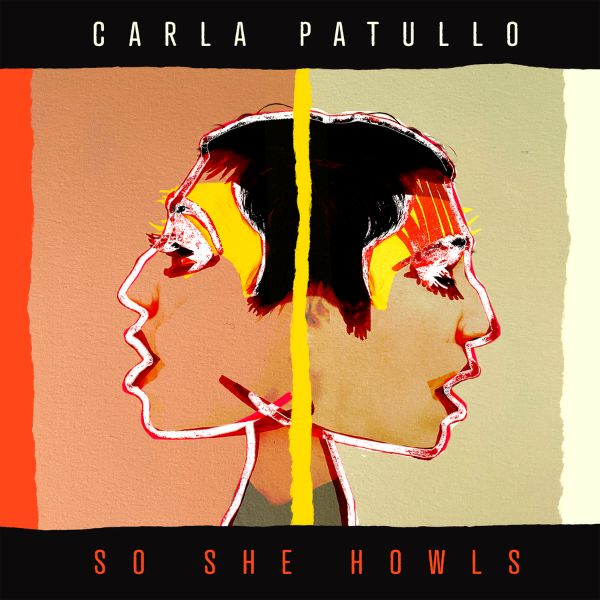
Classical Crossover Magazine: Art has a way of cutting through the mundane, plodding forward we do to survive and bringing us to moments of profound clarity. What are some of the things your art has taught you?
Carla Patullo: Music has taught me how to process and cope with life. It’s opened up pathways to connect with others and even to my own emotions. And I am so grateful that music has opened these connections up for me, because words alone cannot tap into the parts of my mind and soul that I need to learn more about. But music gets me there. When I’m composing or even just listening to music, I can find those emotions and express them fully.
Classical Crossover Magazine: What was the creation process like for “So She Howls?” Do you hear melodies as they are or will be when putting pen to paper?
Carla Patullo: I’m a very melodic composer, and because voice is my primary instrument, I often sing melodic sketches into my phone if I’m on the road or straight into my studio mikes as the first step. My earliest memories of music were of my mom and my nonna, who both immigrated from Italy, singing their small town folk songs to my sister and me. These songs transported us to a different time and place, and also connected us to each other and to our ancestors. Many of the melodies and vocal lines that you hear on this album were recorded in the moment, while I worked through my struggle to survive. They are raw, and rather than being focused on technicalities, I chose to preserve the raw emotions I captured in those moments.

With “So She Howls” composer Carla Patullo captures listeners in a cinematic journey of triumph over loss. Stemming from personal tragedy, her melodies seem to float high above the earth, where space and time allow both the music and listener to breathe again and find hope. Carla has created a unique soundscape of orchestra, percussion and vocals. The use of the human voice is especially important to the story she’s telling, whether howling in pain or soaring in hope, mostly without words, just pure emotion. Like our memories the melodies come with a bit of color and light (If You Listen), visceral pain (So She Howls title track) and acceptance (And Love).
Classical Crossover Magazine: At what stage did your collaborators become involved with the project and what was that experience like for you? Are you someone that relies on intuition or do you tend to explain your vision first? (Scorchio Quartet, Lili Haydn, Tonality).
Carla Patullo: As soon as I felt a sense of the album as a whole, I began thinking about my collaborators. I was searching for the right energy. As I began orchestrating, I reached out to the performers and explained what the album was about and personally where I was coming from. I feel very grateful, because they were all willing to pour their souls into it with me, and I really wanted to bring them into the story and give them each space for their unique voices. The Scorchio Quartet is an all woman string quartet led by Martha Mooke, an acoustic and electric violist, a pioneer really for the electric viola. I had been wanting to work with her for years and this album was the perfect fit. The group (who also include Lorenza Ponce, Frederika Krier, and Leah Collof) performed at the Tibetan House concerts with Philip Glass and Laurie Anderson the year before, and I knew they could get into the mental space surrounding healing. Lorenza Ponce and Leah Coloff both gave hauntingly spectacular solos. I told Lorenza that she needed to get lost in the forest on the track ‘Forest Scenes’, and she did that in the most mesmerizing way. As far as a chorus, I had been following the vocal ensemble Tonality for a while, and I thought they could bring this unity and warmth to the album to connect it all together. We recorded them at my studio in LA called The Soundry. Alexander Lloyd Blake conducted them, and thankfully my studio has very high ceilings, so we were really able to capture a nice room sound. And finally but not least, I’m a big fan of Lili Haydn and love how soulful and expressive she is. I thought she could provide me with wings to emotionally get over to the other side of trauma in the last couple of tracks ‘Earth’ and ‘And Love.’ I gave Lili music, but also told her to add her personal compositional touch, and on the track ‘And Love,’ you can feel her leaving the road map and following her own intuition, and creating a sense of adventure. She’s really brilliant. I have had personal albums before, but this album tracks my journey through one of the toughest years in my life. And I just have so much gratitude towards the players for sharing their energy with me.
Classical Crossover Magazine: As a composer, you’ve written scores for over 30 films, including the upcoming Disney+ film “Maxine.” How does your work in film composition influence your approach to creating a standalone album like “So She Howls”?
Carla Patullo: It’s funny because I often think it’s my solo work that really influences my film scores. But I guess it does go both ways! As I’ve worked more in film scoring, my music has developed a more cinematic sound, and the tracks are really meant to be played in the order of the album in one full listen, as if you were watching a movie. I got into scoring after writing a concept album called A Psychological Thriller, and I personally love to listen to albums as opposed to single tracks. Also, I worked with a fantastic mixer, Daniel Kresco, who I’ve worked with numerous times and who works on a lot of film scores. He mixed it in Dolby Atmos for Apple Music and Tidal. It’s an exciting way to listen to it I think!
Classical Crossover Magazine: The album’s sound evolves from the earlier stages of grief, fear, and the unknown abyss of death to uplifting anthems of recovery and resilience. Can you take us through the creative process of shaping this emotional progression in the tracks?
Carla Patullo: I think it’s through experiencing hardships that we can more fully appreciate life. In writing this album, I was personally trying to heal from trauma so I simply chronicled the entire experience as I was going through it. All of the tracks naturally landed in place and in the end, I had a real story arc with lows and highs. It’s almost a folk tale type of story — one with a happy ending though. I had to remember my experience, and embrace it, which led me to feel so much gratitude during that process. Also, as a side, there is a message if you read the track titles in order.
Classical Crossover Magazine: It must both be very liberating and draining to have captured your journey in music. What are your hopes for the listener as they take this music in?
Carla Patullo: Well, unfortunately and fortunately, I know what it feels like to come out on the other side of trauma now. I hope the listeners can hear the album and travel through the experience with me, facing their own hardships and holding onto hope, light, and adventure on the other side as well.






